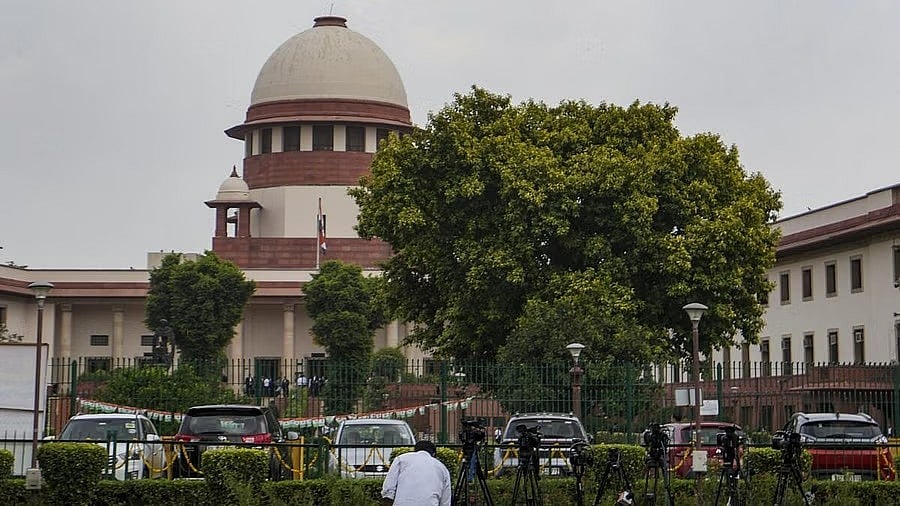
The Supreme Court of India.
Credit: PTI File Photo
New Delhi: The Supreme Court on Wednesday said fake encounters are extra-judicial killings and must be subject to strict legal scrutiny as it directed the Assam Human Rights Commission to conduct inquiry into such allegations independently and expeditiously, in accordance with law.
A bench of Justices Surya Kant and N Kotiswar Singh ordered the Assam government to extend full cooperation to the AHRC and ensure that all logistical, financial, and administrative requirements for such an investigation are promptly and adequately met.
"The gravity of the issues involved, namely, implicating the fundamental rights under Article 21 requires that procedural safeguards are not merely observed in form, but are meaningfully enforced to inspire public confidence in the Rule of Law," the bench said.
The court also directed Assam State Legal Services Authority (ASLSA) to make legal assistance available to any such individuals who may seek support in approaching or presenting their case before the AHRC.
"To ensure justice to the victims and their families, and to uphold the sanctity of the procedure established by law, we hold that the issues raised in the instant petition merit a fair and impartial inquiry," Justice Surya Kant wrote in the 36-page judgment.
The bench set aside the High Court's judgment of January 27, 2023, which dismissed the PIL filed by advocate Arif Md Yeasin Jwadder, alleging as many as 80 fake encounters took place in Assam between May, 2021 and December, 2021.
"The obligation of this court to safeguard constitutional guarantees persists irrespective of the identity or capacity of the litigant, and where concerns arise regarding adherence to judicially mandated guidelines, the constitutional courts must act to preserve both legality and accountability," the bench said.
Examining the matter, the bench said it needs no emphasis that, the use of excessive or unlawful force by public authorities, irrespective of the nature of the offence or the antecedents of the victim, cannot be condoned or legitimised on any pretext.
"Any derogation from the principles of due process, even in the name of expediency or public safety, erodes the foundation of a democratic and civilised society," the bench said, referring to People’s Union for Civil Liberties & Anr Vs State of Maharashtra & Ors (2014).
The court acknowledged the role played by the appellant in bringing to the court’s attention a matter that raises grave and disquieting concerns.
"Given the constitutional importance of the procedural mandates enunciated by this court, it is imperative, in the interest of justice, that an impartial and independent institution undertakes a careful verification of compliance in each case. Such scrutiny, if undertaken in good faith and within the administrative framework already available, will reinforce transparency and accountability in the criminal justice process," the bench said.
The court, however, held no finding of mala fides or institutional bias can be returned through a summary procedure such as the instant proceedings.
The appellant cited 171 individual instances, each warranting objective scrutiny. However, the court found barring a few cases, it is difficult to infer that there has been a procedural breakdown or the PUCL guidelines were flagrantly violated.
"The allegations that some of these incidents may involve fake encounters are indeed serious and, if proven, would amount to a grave violation of the right to life under Article 21 of the Constitution," the bench said.
The court said it is however equally possible that upon a fair, impartial, and independent investigation, some of these cases may turn out to be necessary and legally justified.
"This distinction is critical. The issuance of broad-brush directives without individual scrutiny could result in a miscarriage of justice, either by shielding the guilty or by stigmatising legitimate action by public servants discharging their duty under challenging circumstances," the bench said.
The court felt the invocation of public interest jurisdiction, cannot become a substitute for procedural safeguards and the right of individual victims or their families to be heard.
The risk of issuing general directions in the absence of independent assessment is not merely procedural — it strikes at the very heart of the principles of fairness and due process that underpin our judicial system," the bench said.
The court emphasised at the calibrated mechanism whereby each of the alleged incidents is examined independently, and where victims or their families are accorded a real and meaningful opportunity to participate in the process.
"Their voices must be heard not as a matter of courtesy, but as a matter of right. The function of a constitutional court in such circumstances is not merely adjudicatory, but protective — to safeguard the rule of law, and to ensure that the promise of justice does not remain illusory for those who are most vulnerable," the bench said.
The bench, however, said, upon a comprehensive examination, it emerged that several instances cited by the appellant to demonstrate procedural non compliance of PUCL (supra) guidelines are "factually incorrect or incomplete".
The appellant has failed to independently place on record any cogent or verifiable material to substantiate the allegations, it said.
"In the absence of independent corroboration or affidavits from affected persons, the assertions remain more or less speculative," the bench said.
The court noted FIRs have been registered in all the cases and magisterial inquiries were conducted in several cases.
"However, the record remains inconclusive as to whether this procedural safeguard was uniformly followed in all encounter related incidents, as is mandatorily required," the bench said.
The court said some instances may warrant further evaluation to ascertain whether the guidelines laid down in PUCL have been meticulously complied with, in both letter and spirit.
